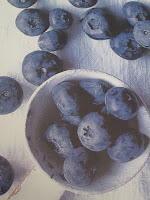We know too much salt can contribute to high blood pressure, but that is not where it stops. Eating too much salt may damage your blood vessels, heart, kidneys, and brain. This information is from scientists at the University of Delaware. They found that high salt intake may impair the endothelium, which is the inner lining of blood vessels involved in blood clotting and immune function, increase hardening of the arteries, weaken heart and kidney function, and interfere with the sympathetic nervous system (the flight-or-fight response.) The USDA recommends no more than 2,300 mg of sodium per day.
Helping you know how to use foods as medicines. You can help your body to heal and stay healthy by the foods you eat!However, with any medical condition, always consult with a physician before any changes in routine, diet or medication.
Showing posts with label Blood clots. Show all posts
Showing posts with label Blood clots. Show all posts
Wednesday, August 20, 2025
Monday, November 28, 2022
BENEFITS OF COLORFUL FRUITS & VEGETABLES PART III
This is the third and last post regarding the benefits of adding colorful fruits and vegetables to your diet. Again, remember this is only a partial list of colorful fruits and veggies and some of the unexpected benefits you can get from them.
- PURPLE - Beets get their color from betalain which helps to flush toxins from the body. No need for harsh "cleansing" routines, just add a serving of beets to your diet every week.
- Purple cabbage (often referred to as red cabbage) has 6 times the vitamin C and more antioxidants per 100 grams that does green cabbage.
- BLUE - Blueberries are often referred to as the ultimate brain food since they defend against dementia and Alzheimer's. Studies have also shown that persons who eat 2 cups of blueberries per week have a 25% less likely chance of developing Parkinson's disease.
- WHITE - Yes, there are white foods other than processed bread and pasta! Garlic is known for its sulfur compounds that convert to a gas that lowers blood pressure. Garlic also reduces the risk of blood clots by stopping platelets from becoming too sticky!
- Cauliflower which contains both vitamin K and omega-3s is known to defend against chronic inflammation and to lower one's risk of both cancer and heart disease when eaten on a regular basis.
- BLACK - Blackberries contain salicylate, a natural pain reliever. They also soothe stomach cramps and ward off atherosclerosis.
- Raisins and other foods containing the mineral boron may provide some of the same benefits as estrogen therapy for women in menopause.
Labels:
Alzheimer's Disease,
Antioxidant,
Atherosclerosis,
Blood clots,
Blood pressure,
Dementia,
Diet,
Fruits,
Inflammation,
Omega-3 fats,
Parkinson's disease,
Salicylate,
Stomach,
Toxins,
Vegetables,
Vitamin C,
Vitamin K
Saturday, November 19, 2022
STRAWBERRIES
Strawberries are the most popular berries in the United States. Not only are they the most popular they are also a healthy choice. Strawberries are loaded with antioxidants, a good source of vitamin-C, and good news for diabetics, they are on the low glycemic index. Following are more health benefits of eating strawberries.
- Because of their high potassium content, strawberries can help lower blood pressure.
- Strawberries are heart healthy. One to two cups daily can help to lower LDL cholesterol. In one study, eating three servings a week decreased the risk of heart attack in women by 32%.
- The antioxidants in strawberries can reduced blood clot formation which can help prevent strokes.
- One study showed that eating 37 strawberries daily significantly lowered the risk of developing complications from diabetes such as neuropathy and kidney disease. Eating two to three servings of strawberries per week lower the risk of developing type 2 diabetes.
- The antioxidants in strawberries can help lower inflammation and block tumor growth.
Tuesday, August 23, 2022
BENEFITS OF EATING ONIONS
Onions are not known for their nutritional value! However, the green tops of onions are a good source of vitamin C. So don't toss the tops from your green onions! Chop the tops fine and toss into salads, soups, potatoes, etc.
Onions can serve a variety of uses other than just adding flavor to our dishes. Some of these ways include:
- When cutting onions their sulfur compounds combine with enzymes to form a type of sulfuric acid. This is what causes us to "cry" when peeling or cutting onions. This may actually help clean nasal passages that are congested.
- The sulfur compounds in onions block the potential of some cancer-causing carcinogens.
- Onions have a mild antibacterial effect.
- Some studies indicate onions may protect against the artery-clogging damage of cholesterol by raising the levels of the high-density lipoproteins (HDLs) which are the protective proteins.
- Research has also shown that adenosine, a substance in onions, hinders clot formation which could offer heart protection.
Subscribe to:
Posts (Atom)



